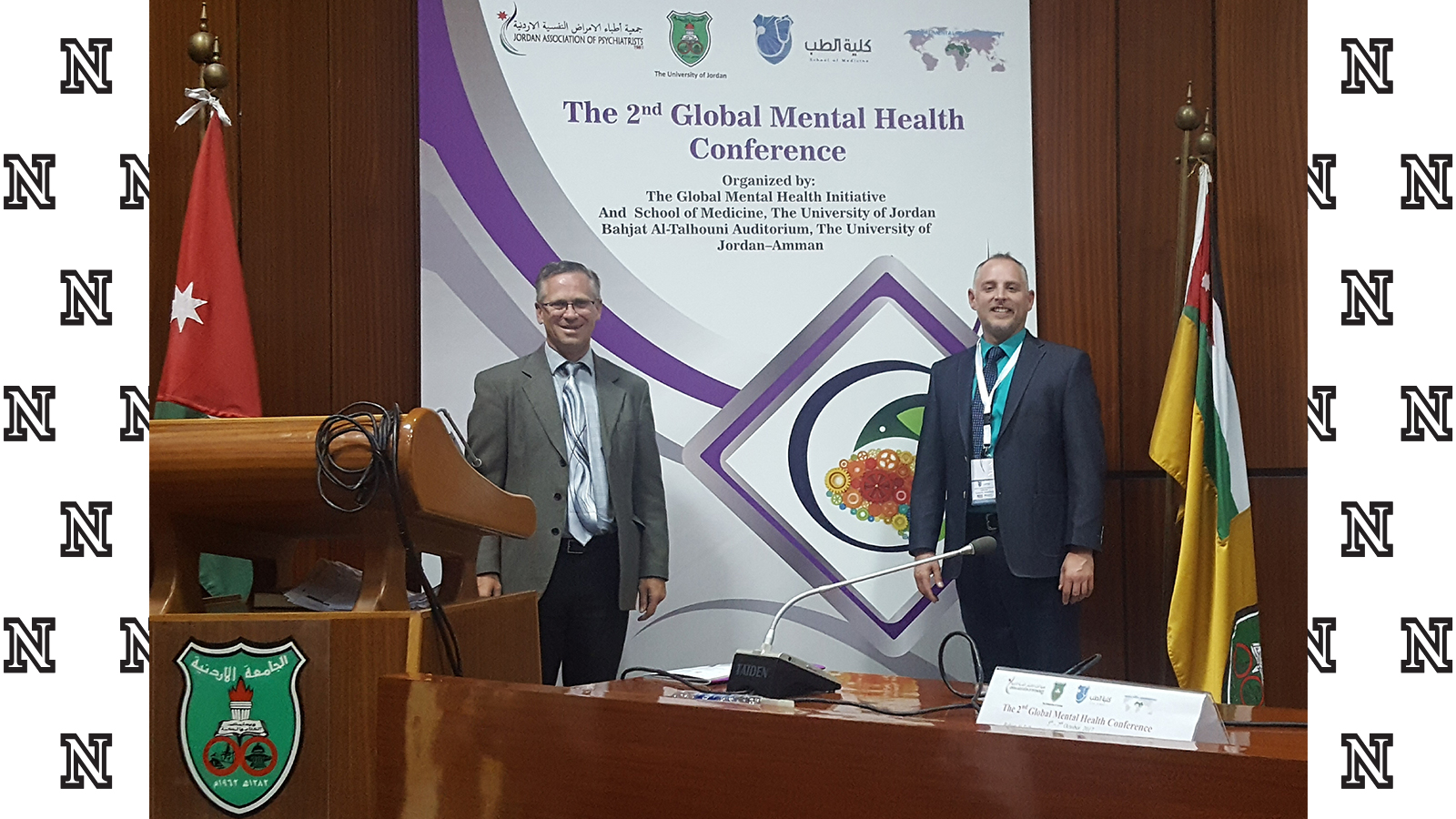
Bischoff and Springer join collaborative mental health initiative in Jordan
30 Nov 2017 By Kari Eller
The Second Global Mental Health Conference in Jordan was held October 5-7 under the patronage of her Royal Highness, Princess Diana Mired, at the University of Jordan in Amman with two special guests from Nebraska. Richard Bischoff, Gwendolyn A. Newkirk professor and department chair of Child, Youth and Family Studies, and Paul Springer, acting associate dean for academic affairs in the College of Education and Human Sciences, were invited to present their research on unconventional mental health care strategies to reach underserved populations. They joined representatives from other organizations such as CARE International, the World Health Organization and the International Medical Corps.
“A Jordanian professor from the University of California San Diego heard of the work that we are doing in community capacity building, task shifting and tele-mental health in collaborative care environments as well as our contributions to several global mental health initiatives,” said Bischoff.
The invitation came at a significant crossroads for Jordan as they grapple with mental health challenges in the country that have been exacerbated by the Syrian refugee crisis. “I was surprised and honored to receive the invitation,” added Bischoff. “We were two of seven American researchers who were invited.”
Mental health care in Jordan faces several dilemmas. “In Jordan, stigma associated with mental health care can be so debilitating that one family member diagnosed with a mental health disorder, affects the entire family. A sister of a brother who seeks mental health care may find it nearly impossible to find a suitable marriage partner,” explained Springer.
A lack of federal policies, trained mental health professionals and funding to support mental health care have intensified the situation in Jordan. Only 60 psychiatrists serve the entire country and fewer non-medically trained counselors and mental health therapists are available. Under the current model, individuals seeking care first turn to their primary doctors for support. However, many of these doctors are not trained to treat basic mental health problems, and therefore, many individuals go undiagnosed or do not receive adequate care. Patient unfamiliarity with the system and the stigma involved in seeking additional mental health services results in a lessened probability that they will go elsewhere for help, leading to further distress and suffering.
Though there is an interest in mental health careers in Jordan, a lack of training programs makes it difficult to nurture this interest and to help people see this as a viable career option. The country has taken in approximately 1.4 to 1.5 million Syrian refugees, which has strained the economic and social fiber of the country and introduced new challenges in the provision of mental health care. All these factors combine to create significant inequalities and barriers for individuals and families to access care in Jordan.
During the conference, Bischoff and Springer presented on the importance of engaging people in rural and underserved communities to address mental health disparities through a model they developed. Their model emphasizes a collaborative care approach, working closely with local providers to improve community interactions, mental health literacy, referrals, and the acceptability of mental health treatment through innovative strategies in unconventional settings. Easily transferable to other country settings and adaptable to local needs, this model offers a possible option for mental health service needs in Jordan.
“This conference was very productive and resulted in the first discussions among professionals related to mental health policy in Jordan,” said Springer. “As we work together with colleagues across borders, we are better able to share ideas, and initiate interventions that are truly collaborative, feasible and sensitive to the culture of the country and community. This type of partnership is essential, to bring about crucial services and shed light on the importance of mental health care, not only in Jordan but also around the world.”
“There is a need to improve mental health practice through approaches developed to address country-specific, or even community-specific needs,” Bischoff added. “Spaces created for dialogue such as this conference, allow professionals to construct knowledge in the community and work together to advance a global strategy that places mental health care as an international priority.”
While at the conference, Bischoff and Springer connected with providers who are interested in partnering to apply their global model within Jordanian communities and among the refugee populations. Moving forward, they will continue to nourish these relationships and engage in future endeavors with the University of Jordan in Amman.
College of Education and Human Sciences